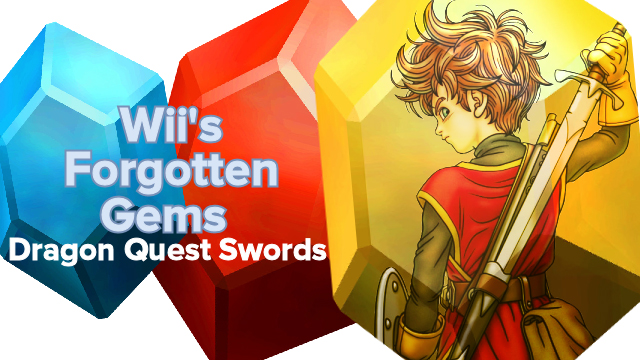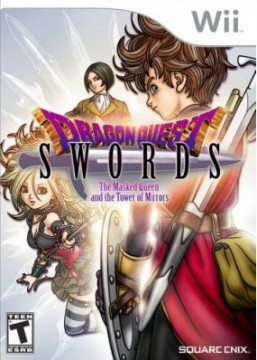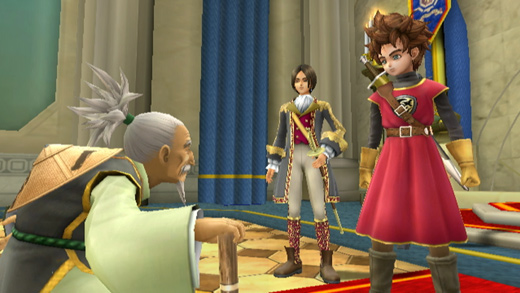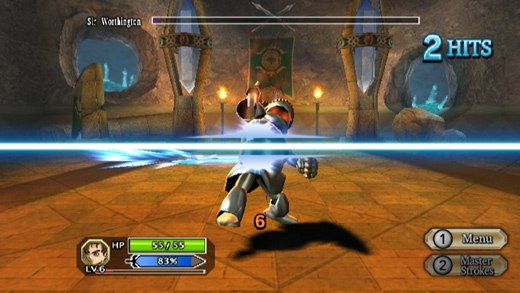
 Release Date: February 19, 2008
Release Date: February 19, 2008
At one point, developers thought that “waggle” was the way of the future. During those early, formidable years of Wii’s life, it seemed like any and every game was trying its damnedest to implement the best version of motion controls possible. Regrettably, those attempts usually failed and left us with broken games and broken hearts. There was one little gem, however, that managed to concurrently sneak under the radar and use motion controls to elevate its core gameplay in a rather effective way. This was a jewel often overlooked, over-scrutinized, and sometimes simply unknown to certain gamers.
Dragon Quest Swords: The Masked Queen and the Tower of Mirrors, not only had the longest title in the history of video games, but it was also one of Square Enix’s first full-fledged adventures on Nintendo’s white box. It had been hyped long before its release mostly because it would be the series’ first foray into Wii territory, and, being the first Dragon Quest game to grace audiences since the spectacular Dragon Quest VIII, fans had high hopes, and even higher expectations. Swords wasn’t exactly what people thought it would be though. Yes, it was an RPG, but it made heavy use of the Wii Remote, to the point that it drastically changed up the traditional gameplay formula found in most other Dragon Quest installments– a formula fans had grown to adore.
It was because of this, as well as the less epic scale and feel to the game, that Swords ultimately was disregarded as a true RPG heavyweight in the role-playing genre. Unfortunately, The Masked Queen and the Tower or Mirrors never got the praise it deserved due to the fact that it was standing in the shadow of its brethren from day one. Swords was a solid RPG experience that was brought down mostly by its own lineage. If gamers were able to more easily look past its name, they would find a very accessible roleplaying game with a host of charming qualities.
For starters, Dragon Quest Swords sports a small, close-knit, and well detailed cast of characters that are almost immediately likeable. They may not be the most expertly crafted personalities around, but they are relatable and have a delightful dynamic that adds to the narrative in a distinct, personable way. In most JRPGs, the cast of characters is extensive, and because of this, many get lost in the shuffle. Here, however, there are only four main characters, none of which ever feel like placeholders or an afterthought. They interact naturally and offset one another to the point that it’s a real treat to see them on screen at the same time.

The characters are only one part in all of this, because, in truth, they are brought to life by the game’s mysterious and fascinating storyline. All right, so it’s nothing that’s going to blow your mind, and in truth, it’s not terribly epic, but it’s tight, well thought out, and has a fantastic amount of suspense thanks in part due to excellent pacing and well directed cut-scenes. To avoid any spoilers, I will simply say that the Queen, and of course the game title’s intrepid tower itself, create a backdrop for a story that feels intriguing, and is the reason why I often found it difficult to put the game down. It has the uncanny ability to pull you in, and not let you go. There were too many instances in which I meant to play the game for fifteen minutes, and finally walked away from the television an hour or two later.
Even at first glance, though, Swords is a beautiful game. The graphics are vibrant and cheery; character models look great, and environments are varied. Although Wii has never been a graphical powerhouse, Swords‘ developer pushed the hardware, and as a result, gave us something that looks brilliant given the console’s technological limitations. Going one step further, Dragon Quest has always been known for its wonderful soundtracks, and The Masked Queen and the Tower of Mirrors is no exception. Although composer Manami Matsumae had no previous experience with the franchise, she showed that her work, while not at the top of the list, is nevertheless strong, moving, and can add to overall tone very well. Regardless of the aesthetics, or audio, the presentation values in Swords is typical Square-Enix, top-notch stuff.
As eluded to in the beginning, however, it was the combat that acted as Swords’ scarlet letter. The battling uses the Wii Remote completely, and requires, not encourages mind you, players to swing the remote in various directions to dispatch foes. Tossing the controller horizontally, vertically, and diagonally to attack monsters which are placed strategically in specific sectors of the screen that can only be attacked with the appropriate sword swing (in this case, remote waggle) drove some gamers bonkers. After twenty years of traditional turn-based combat, developers choosing to modify the core of one of its flagship series didn’t sit well with most. Essentially, the franchise was turned upside down with this design change, and considering the “waggle” mechanics weren’t exactly responsive – they definitely weren’t 1:1 – it didn’t make fans any more willing to embrace the transformation.

In truth, though, it wasn’t all that bad. Yes, it was different, but I think it was an experiment that mostly succeeded. At the very least, Swords could not have worked on any other system, at least not at the time it came out when the Move and Kinect weren’t around. The simple fact that Swords gets overlooked mostly because of this change in combat is quite frankly obtuse and merely the product of fanboys getting off on their own arrogance and belief that it’s “cool” to disregard anything on the Wii.
Dragon Quest Swords: The Masked Queen and the Tower of Mirrors is a sound, solid title that fell victim to poor marketing, bad press, and the wrath of disgruntled, self-righteous fanboys. If we can put all that aside, we see that Swords has a wonderfully, small-scale story, precious characters, vibrant graphics, captivating audio, some great, though undeniably RPG-lite, gameplay elements, and some motion controls that add to the overall immersion. Dragon Quest Swords is not grand in scope, but that’s the reason why it succeeds. It’s intimate, quaint, and ultimately heart-warming because of it.




 ShareThis
ShareThis







After getting past some initial disappointment that this game was a simple “on-rails RPG” instead of a true Dragon Quest adventure, I was firmly impressed with Dragon Quest Swords. The world is well realized, the mix of RPG and arcade mechanics is both fun and compelling, and the motion controls are better and more responsive than most reviewers suggest. (However, if you hate motion controls then this game is unlikely to change your mind.)
One thing that isn’t often mentioned, there is a decent amount of post-game content to go through for a game that sometimes feels more like Punch-Out!! than a true RPG. Even if the main quest is relatively short, you might find yourself investing more time than expected with this little gem.
Ejamer, you’re totally right – in spite of of the game’s short story mode, and sometimes confining on-rails gameplay mechanics, it sported a decent amount of extra and post-game content. In the end, Swords may feel lacking at times, but its sheer amount of heart is what I fell in love with.
I love Dragon Quest Swords :) sure its on rails but I think what gets it through as a solid game experience is the storyline and just plain Charm of the game. I could have done without the motion controls but I guess the game was designed to have that in it anyway. I’m just old fashion give me a classic controller. Loved this one though it was a nice runthrough and should not be missed
I’m right there with you, Windy; I am much more into classic gaming conventions than newfangled mechanics. Having said that, even though I would’ve preferred DQS to at least include an option to play with a classic controller, I think the motion controls worked better, and felt more practical, than many other waggle-fests found on the Wii. As you pointed out, the one aspect that really shouldn’t be missed by gamers is Swords’ immense charm. It permeates the entire experience, and because of that, I always encourage folks to play it, if they haven’t already.